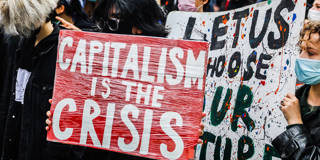Three recent books combine theoretical sophistication and historical method in ways that enable us to rethink majority rule and thus re-imagine the future of democracy. And the most searching of the three calls into question whether that future is compatible with capitalism as we have come to know it.
NEW YORK – The great bourgeois revolutionaries who invented modernity, from John Milton to James Madison to Abraham Lincoln, didn’t know they were laying the foundations of capitalism. To be sure, they understood that a money economy – a social system animated by the impending commodification of everything, even labor power – was laying waste to inherited, mostly parochial hierarchies, redefining liberty and making the idea of equality a live option. But they would be appalled by a global civilization in which the market is the measure of all things, where everyone finally has a price and each must buy the right not to die. No one would be more horrified than Adam Smith, the philosopher-king of the Scottish Enlightenment and the first court poet of bourgeois society.

Francis Fukuyama, Liberalism and Its Discontents (Farrar, Straus and Giroux, 2022)
Pranab Bardhan, A World of Insecurity: Democratic Disenchantment in Rich and Poor Countries (Harvard University Press, 2022)
NEW YORK – The great bourgeois revolutionaries who invented modernity, from John Milton to James Madison to Abraham Lincoln, didn’t know they were laying the foundations of capitalism. To be sure, they understood that a money economy – a social system animated by the impending commodification of everything, even labor power – was laying waste to inherited, mostly parochial hierarchies, redefining liberty and making the idea of equality a live option. But they would be appalled by a global civilization in which the market is the measure of all things, where everyone finally has a price and each must buy the right not to die. No one would be more horrified than Adam Smith, the philosopher-king of the Scottish Enlightenment and the first court poet of bourgeois society.